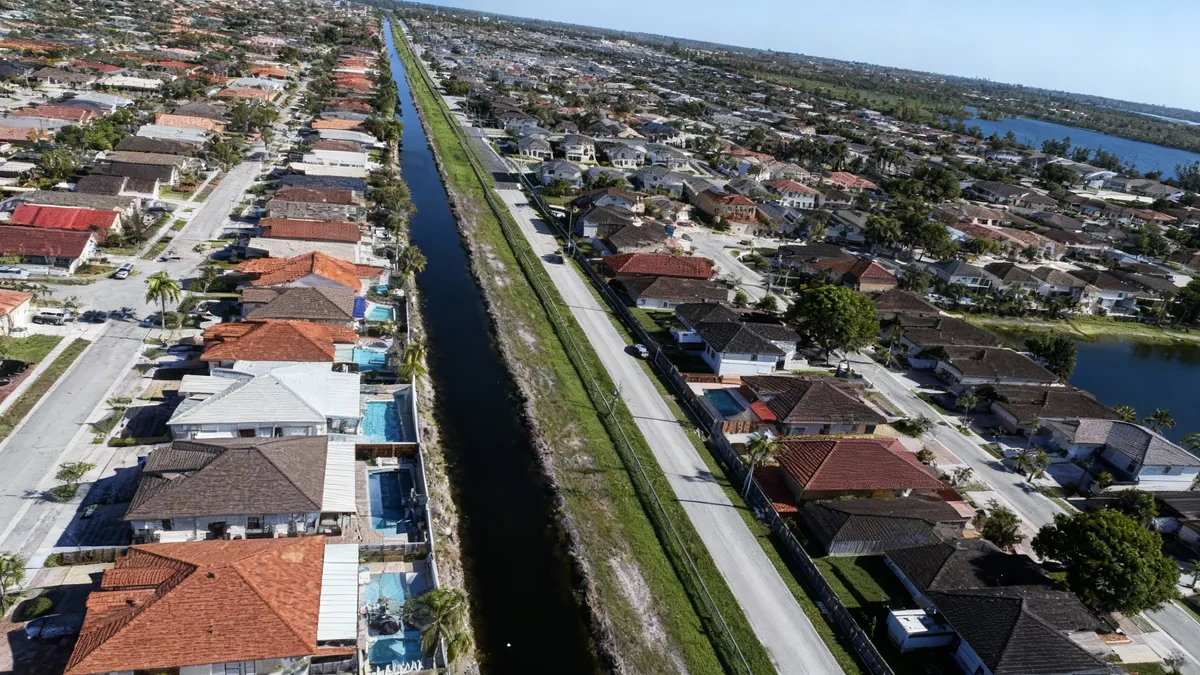Home sellers across the United States may soon face market conditions that have already arrived in Florida. The state's housing market is experiencing a significant slowdown, with homes lingering for sale longer and inventory levels rising, providing a potential preview of a broader national trend expected in 2026.
Data shows a growing divergence between Florida and the rest of the country. While the national median time for a home on the market held steady at 62 days in September compared to 2019, homes in Florida sat for a median of 88 days — a full two weeks longer than pre-pandemic levels. This shift signals a return of buyer leverage and increased competition among sellers.
Key Takeaways
- Florida's housing market is cooling faster than the national average, with homes staying on the market for a median of 88 days.
- Active home listings in Florida have surged by 23% compared to 2019, while national listings have decreased by 10%.
- Experts predict that home price gains will flatten nationally in 2026 as mortgage rates stay above 6% and more homes become available.
- Sellers are advised to focus on presentation, competitive pricing, and pre-listing inspections to succeed in a more balanced market.
A Shift in Market Dynamics
The Sunshine State has become a bellwether for a cooling U.S. housing market. A combination of high mortgage rates, soaring home prices, and rising insurance costs has dampened buyer enthusiasm and purchasing power. This has led to a noticeable slowdown that began in Florida before becoming apparent in other regions.
"Our market started weakening before it was noticeable most other places," said Brad O’Connor, chief economist for Florida Realtors. He attributes this to the combined impact of higher rates and prices, which affected not only local buyers but also the steady stream of people moving into the state.
By the Numbers: Florida vs. U.S.
In September, active home listings in Florida were approximately 23% higher than in the same month in 2019. In contrast, the national active listing count was about 10% lower over the same period.
This increase in available homes for sale is a critical factor. More inventory means more choices for buyers and more competition for sellers. This is particularly true in areas with significant new home construction, such as the Tampa metropolitan area, where the influx of new builds is adding pressure on the resale market.
Lessons for Sellers Nationwide
As the market rebalances, homeowners planning to sell in 2026 may find themselves in a similar environment to what Floridians are experiencing today. The era of bidding wars and waived inspections that defined the post-pandemic boom is fading. The Mortgage Bankers Association forecasts that home price gains will likely flatten in 2026, driven by mortgage rates remaining above 6% and a steady increase in housing supply.
"It is not 2024, and the buyer has a whole lot more leverage," Mike Fratantoni, chief economist for the Mortgage Bankers Association, recently stated. This shift requires sellers to adapt their strategies to stand out in a more crowded field.
Real estate agents on the ground confirm this change. Amy Simmonds, a Compass agent in northern Palm Beach, Florida, noted that the homes selling quickly are a select few. "It’s not like you can slap some fresh paint on your house anymore and hope for the best," Simmonds said. Buyers are more discerning and less willing to overlook flaws unless the price reflects a significant discount.
Preparing Your Home for a Competitive Market
In a buyer's market, preparation is paramount. Experts advise sellers to focus on the elements within their control to make their property as attractive as possible.
The Importance of Pre-Inspection
Identifying and addressing potential issues before listing can prevent deals from falling apart during the inspection phase. Mario Gonzalez, president of the Northeast Florida Association of Realtors, emphasized the value of knowing your home's condition upfront.
"The better a seller knows their home, the less surprises will be there once there’s a buyer involved," Gonzalez explained. He notes that fixing a problem like termites beforehand is often less costly and less of a setback than having a buyer discover it.
This proactive approach builds buyer confidence and can lead to a smoother, faster transaction.
Presentation and Staging
First impressions are crucial. Agents stress the importance of decluttering, professional photography, and ensuring the home smells clean and fresh. For empty properties, professional staging can make a significant difference.
"Homes that are vacant or that don’t feel good upon arrival" tend to sit on the market, Simmonds observed. "Unless the buyers think they’re cheap and they’re getting a smokin’ deal, they are not going to buy it."
Smart Renovations
While major renovations can be risky, targeted updates often provide a good return. According to Gonzalez, kitchen and master bathroom projects tend to be the most valuable. However, he cautions against over-investing. A $15,000 kitchen refresh might achieve a similar sale price to a $50,000 overhaul. Smaller projects like new flooring and fresh, neutral paint are generally considered safe and effective investments.
Pricing and Positioning Strategy
Perhaps the most critical element in a slowing market is pricing. Overpricing a home can lead to it sitting on the market, which often results in price cuts that can stigmatize the property. "The sellers’ wishes don’t set the price, the Realtor’s wishes don’t set the price, the buyer’s wishes don’t set the price—it’s truly the market setting the price," Gonzalez stated.
The recommended strategy is to price the home competitively from the start. Simmonds advises sellers to "list it really where it should sell, and try to get as close to that listing price as possible."
To make a property memorable, she suggests adding a unique touch to an otherwise neutral and appealing home. This could be:
- A tasteful accent wall
- A unique kitchen backsplash
- Modern and attractive light fixtures
- Small details that elevate the home's character
Ultimately, success in the evolving market comes down to a simple formula. "You have to have curb appeal, it has to be clean, it has to show well, and it has to be priced right," Simmonds concluded. For homeowners across the country, the lessons from Florida are clear: preparation, realistic pricing, and strong presentation will be the keys to a successful sale in the years ahead.





